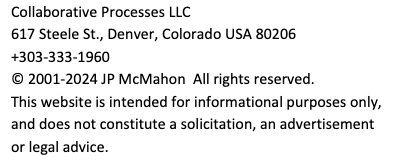Our approach
Collaborative processes works with the following principles and understandings:
- Collaboration is a perspective, not a set of tools or skills. As such, a person or organization does not merely ‘learn’ or adopt it; rather it is adopted as an organizing perspective.
- Collaborative Processes’ role is to encourage the behaviors and attitudes that foster collaboration.
- Collaboration requires: (a) an appropriate context, (b) a will to collaborate, and (c) competence in basic collaboration skills.
- Although many situations are complex and challenging, the key is in the attitude (and therefore the behaviors) of the participants. If you want it to work – it will.
Influential thought leaders. In addition to the colleagues with whom we have worked, our thought leaders, mentors or influential authors/speaking include the following persons – who have shaped our thinking about collaboration and addressing conflict:
- Professor Clyde Martz as a leader in law, advocacy, negotiation and conflict resolution.
- Gary Friedman, Jack Himmelstein and Bob Mnookin on mediation.
- Johan Galtung, author of many books and articles on conflict.
- Professor Alan Fowler on organizational development and systems thinking in consultation.
- Edgar Schein on the role of consultant.
- Professor Carl Larson and David Chrislip on collaborative leadership.
- Professor Stan Christensen on discussion leadership.
- Professor Howard Raiffa on negotiation and decision analysis, as updated and amended by Daniel Kahneman.
- Professor John Paul Lederach on conflict transformation.
- On what it means to be human, Thomas Keating, Richard Rohr, Jurgen Moltmann, John O’Donahue, David Whyte, Thich Nhat Hanh, Bill Plotkin and Sogyal Rinpoche.

